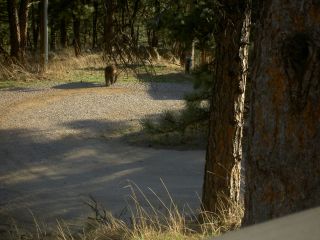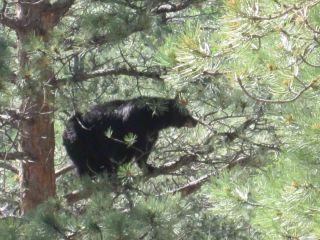Environment
Being "Mad About Wildlife" and Redecorating Nature
Coexistence with animals means living peacefully together.
Posted June 5, 2012
I'm constantly being asked about how to survive with the animals into whose homes we've wantonly trespassed as we incessantly redecorate nature. More and more people say they want to
"return to nature" and live among other animals, but many decide that actual co-existence comes at too much of a cost when the animals become "pests." So, the human intruders (and we are indeed an invasive species) decide how they're going to share space and far too often the native residents or those who have moved in and lived in a particular area for years on end - the animals themselves - get the short end of the stick, so to speak, as they're relocated, trapped, poisoned, or shot.
As the very animals who were at first attractive become annoying they're treated as disposable things rather than as living beings. The Humane Society of the United States along with many other organizations has long been interested in the "problem" of urban and suburban wildlife and a new publication called "Living with Wild Neighbors in Urban and Suburban Communities" is now available. A snippet from their introduction is very informative:
"In recent decades, our cities and suburbs have grown and taken over rural areas. Many wild species take advantage of conditions they find—the conditions we created.
"We unwittingly created ideal habitat in our cities and suburbs for many wild species. If you could ask a Canada goose what the perfect place to live looked like, she would describe a golf course. While we think of white-tailed deer as forest dwellers, they actually prefer edge habitat—places where woods meets open areas, common in modern suburbs and along our highways.
"City dwellers and suburbanites usually have limited experience with wildlife before an issue comes up. They often don’t understand why a problem occurs and rarely have experience with similar conflicts. They look for an easy “silver bullet” solution which almost never exists.
"A common misconception is that getting rid of the animals will get rid of the problem. The reality is that nature abhors a vacuum: Removing animals simply allows the remaining animals to reproduce more successfully and invites more in to fill the empty space. Effective solutions need to address the conditions that attract animals into conflict with us."
This particular publication deals mainly with human conflicts with Canada geese who sometimes are poisoned or shot because they poop on golf courses, white-tailed deer, beavers, and coyotes, but there's no dearth of information available for how to coexist humanely and ethically with many other urban dwellers (see also and and and).
We all make choices about where to live and need to take into account the lives of the animals we've affected or are going to bother when we redecorate their homes. Many neighborhoods show concern for their local fauna. A few weeks ago on a bicycle ride up to the small town of Jamestown outside of Boulder, Colorado, I saw a sign about the local foxes asking drivers and cyclists to slow down so that the foxes would be safe. It's still there and many people have told me about it as well. And the town of Superior, Colorado has formed a partnership with California-based Project Coyote to promote a project for peaceful coexistence of people with coyotes.

I've also had a few close encounters of the lion kind, on three occasions finding myself within touching distance of a cougar. I survived these encounters and frankly don't need to meet another cougar up close and personal.
I've also had black bears try to enter my house and keep me confined inside because they liked hanging out on my outdoor porch. One large male bear had the audacity to leave a huge pile of poop near my front door because I'd asked him to leave so I could get to the airport on time. Another large male casually walked on to my porch as I was eating dinner. He was about 6 feet away so I ran into my house and closed the screen door and he walked over and tried to slide it open. I told him that this was my dinner as I slid the glass door closed and he walked off as if nothing had happened. I didn't think my vegan fare would be of interest. I got a nice picture of him leaving and sauntering slowly to a house down the road where he immediately went to sleep under a hammock.

A local bear strolls away from my house
That's the way it is where I and many others choose to live, and I welcome my wild neighbors to come back anytime. I love seeing them and knowing they're around. Nonetheless, I've had to change my habits from time to time but that's because I've chosen to live in their living rooms. As I write this essay there's a beautiful mama bear and her two cubs living around my house. She's been around for at least 2 years. Just yesterday 2 other adults joined her and now there are 5 gorgeous bears hanging out on their land. All of the people on my road are incredibly excited to have these magnificent bear beings around and we constantly share photos and videos about their meanderings.

Mama bear around my house; 2 cubs are above her in the tree
Part of rewilding ourselves and our hearts is to embrace the animals with whom we share space and time and appreciate that when we have to change our ways it's an indication that we know we are indeed sharing space with other beings who care very much about what happens to them, their family, and their friends. If you're not willing to make these changes and you choose to ignore nature then perhaps it's best not to live where magnificent animals roam and try to survive. I've often asked realtors to be up front with people when showing them homes or lots where wild animals live.
But, I'm "mad about wildlife"
People often tell me they're "mad about wildlife" and I've come to see that this phrase has a double meaning. When people say they're mad about wildlife and love wild animals and then harm them, often causing intense suffering and death, I always say I'm glad they're not mad about me. Our fickleness causes great harm and it's an arrogant and anthropocentric double-cross to choose to move into areas where wild animals are known to live and then compromise their lives.
I find it challenging to figure out how to coexist with my wild neighbors so we can all live safely and in peace and I know many others do too. We can learn a lot about other animals and ourselves when we appreciate just who our wild neighbors are. Youngsters can learn valuable lessons about other animals and other nature as well. We can all be Companions in Wonder as we share experiences and explore our wonderful planet.




